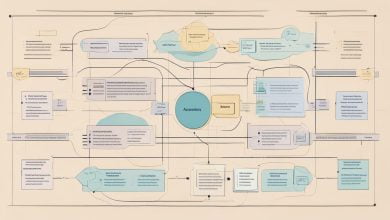
Software development can be a complex process, but it doesn’t have to be. Keeping it simple and straightforward is a fundamental principle that can improve code quality, maintainability, and user experience. Developers who prioritize simplicity are more efficient, produce fewer errors, and ultimately create better applications overall. This article will explore the concept of KISS in software development and strategies for easy and user-friendly software development.
Key Takeaways:
- KISS (Keeping Software Development Simple and Straightforward) is a fundamental principle for creating efficient and user-friendly applications.
- Prioritizing simplicity in software development can improve code quality, maintainability, and user experience.
- Strategies for easy and user-friendly software development include user-centered design, intuitive interfaces, and efficient workflows.
- Using tools such as integrated development environments (IDEs), version control systems, and automated testing frameworks can enhance the efficiency of software development.
The Art of Simplicity in Software Development
When it comes to software development, simplicity is key. By keeping code straightforward and efficient, developers can create applications that are easy to maintain, debug, and scale. In this section, we’ll explore the principles of simplicity in software development and how they contribute to better code quality and maintainability.
At its core, simplicity in software development means keeping things straightforward and easy to understand. This can be achieved in many ways, from writing clean, well-organized code to using intuitive user interfaces that guide users through complex tasks.
One of the key benefits of straightforward software development is that it reduces the likelihood of errors and bugs. When code is simplified and easy to follow, it’s easier for developers to spot and fix issues before they become major problems. Additionally, simple code is easier to scale and maintain, which can save valuable time and resources in the long run.
The Importance of Straightforward Software Development
To create efficient and error-free applications, developers must prioritize straightforward software development. This means taking a systematic approach to coding and design, using well-documented libraries and frameworks, and following best practices for naming, code formatting, and commenting.
Another important aspect of straightforward software development is testing. By writing automated tests that verify the behavior of their code, developers can catch bugs early and ensure that their applications are working as intended. Additionally, thorough testing can help identify areas where code can be simplified or optimized for better performance.
Overall, simplicity and straightforwardness are essential principles for efficient software development. By prioritizing these principles in their coding practices, developers can create applications that are easy to use, maintain, and scale.
Strategies for Easy and User-Friendly Software Development
Developing software can be a complex and challenging process, but keeping it simple and user-friendly is crucial for a successful outcome. Here are some strategies and techniques for achieving easy and user-friendly software development:
User-Centered Design
Designing software with the end-users in mind is key to creating an easy and intuitive user experience. Take the time to understand the users’ needs, preferences, and pain points. Conduct user research, user testing, and gather feedback to continuously improve the software based on real user experiences.
Intuitive Interfaces
Intuitive interfaces should be the norm in software development. Users should be able to easily navigate and interact with the software without needing extensive training or instructions. Use simple and clear language, avoid cluttered interfaces, and provide visual cues to guide users through the software.
Efficient Workflows
Developers should strive to create software with efficient workflows that allow users to complete tasks quickly and easily. Streamline processes and minimize the number of steps required to complete a task. Use automation and shortcuts where possible to reduce manual work and enhance user productivity.
Simplifying Complex Tasks
Complex tasks can be daunting for users, but simplifying them can make the software more user-friendly. Break down complex tasks into smaller, more manageable steps. Use plain language and provide helpful tooltips or walkthroughs to guide users through the process.
Reducing Code Complexity
Software development can become complicated, and complex code can lead to inefficiencies that affect the user experience. Simplify code by using best practices and design patterns. Regularly refactor code to remove unused or redundant components and make it more readable and maintainable.
By following these strategies and techniques, developers can create easy, user-friendly, and simplified software that meets users’ needs and expectations.
Tools and Resources for Efficient Coding
To create efficient software, developers need to use appropriate tools and resources that can enhance their coding processes. Various software development tools are available that can improve productivity, reduce errors, and streamline the development process.
Integrated Development Environments (IDEs)
IDEs are software applications that provide a comprehensive environment for software development. They typically include a code editor, debugging tools, and a compiler or interpreter. IDEs can help developers write code more efficiently and provide features such as code completion, auto-formatting, and syntax highlighting to make coding more accessible.
Version Control Systems
Version control systems (VCS) are critical for software development. They allow developers to keep track of changes to their code, collaborate with other developers, and revert to previous versions if necessary. Some popular VCS tools include Git, SVN, and Mercurial.
Automated Testing Frameworks
Automated testing frameworks allow developers to test their code without manual intervention. They can help identify errors early in the development process, reducing the overall time and cost of development. Popular testing frameworks include Selenium, JUnit, and TestNG.
Code Analysis Tools
Code analysis tools can help developers identify potential errors and security issues in their code. These tools can analyze code and identify potential performance bottlenecks, code duplication, and security vulnerabilities. Some popular code analysis tools include SonarQube, ReSharper, and Coverity.
Code Libraries and Frameworks
Code libraries and frameworks can save developers significant time by providing prewritten code and functionality that can be integrated into their projects. Popular libraries and frameworks include React, Angular, and jQuery.
By using these tools and resources, developers can create efficient and high-quality software in less time. However, it is essential to choose the right tools for the job and to ensure that they integrate well with other tools in the development environment.
Conclusion
Mastering KISS, or Keeping Software Development Simple and Straightforward, is key to creating efficient and user-friendly applications. In this article, we’ve explored the importance of simplicity in software development and provided strategies for achieving easy and user-friendly applications. We’ve also discussed tools and resources that can enhance the efficiency of coding.
By implementing the principles of KISS, developers can improve code quality, maintainability, and productivity. So, let’s keep software development simple and straightforward.
FAQ
Q: What is KISS in software development?
A: KISS stands for Keeping Software Development Simple and Straightforward. It is a principle that emphasizes the importance of creating efficient and user-friendly applications by keeping the development process simple and straightforward.
Q: Why is simplicity important in software development?
A: Simplicity in software development contributes to better code quality and maintainability. It helps reduce complexity, making it easier to understand and debug code. Simple and straightforward software development also leads to more efficient and error-free applications.
Q: How can simplicity be achieved in software development?
A: Simplicity can be achieved in different stages of the development process. For example, in design, it involves creating intuitive interfaces and user-centered designs. In coding, it means writing clean and readable code. And in testing, it involves focusing on essential functionalities and minimizing complexity.
Q: What are some strategies for easy and user-friendly software development?
A: Some strategies for easy and user-friendly software development include adopting a user-centered design approach, creating intuitive interfaces, and following efficient workflows. It is also crucial to simplify complex tasks, reduce code complexity, and consider the end-users’ perspective throughout the development process.
Q: What tools and resources can enhance efficient coding?
A: Various tools and resources can enhance efficient coding. Integrated development environments (IDEs) provide features that streamline coding processes. Version control systems help manage code changes efficiently. Automated testing frameworks aid in testing and detecting errors. Using these tools can improve productivity and efficiency in software development.







